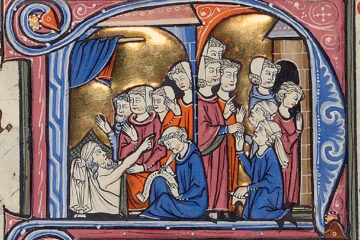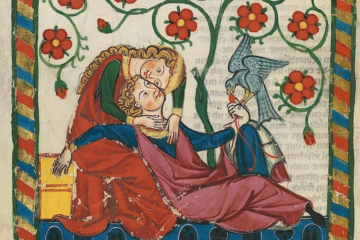In Nomine Patris et Filii et Spiritus Sancti,
My Good Liege, My Good King, this letter is to arrive in due haste to your glorious court with the rising of the earliest sun. I fear that even such speed may be too sluggish. War has come to the French border March Lords. I have at my court, five of your March Lords’ messangers here all reporting skirmished along the Bretonian-French line. They send reports of men-at-arms and peasants crossing unto your lands and raiding them for easy gold, wheat, livestock, and people. There has been little loss of life, but the Marches are organizing a defense of your land, and they request aid from both you, and their liege lords. The Bretonians are said to have invaded the lands of Dover, both on the continent and in Britannia. They aim to conquer them in their entirety, claming them to be vile heretics. The Church has yet to stop them, but I fear your shield must, perhaps even your sword. In invading the Norman part of Dover, they have crossed into one of your Duchies, Norman-Dover, and they seek to bundle their gains into a single new torritory. Your people suffer at the hands of the Bretonian filth who dare march against the rightful King of France. As the Duke of Chatersberg, I beseech thee Good King, send in your army and delay their assault. The English will reppel their armies in the north, while you must defend your own in the south. Call upon your vassals, Duke Alfred I Dover, Countess Elizabeth I de Maine, and Duke Charles II Anjou-Sirius, and lead them into war. Chatersberg has always been a loyal ally to the crown, and now we feel the time has come to prove this by offering our forces to fight the Bretonian threat. If they day is lost, I fear your Crown might break, your Grace. God is with us, we will not fail. Send word at your earliest convenience.
Duke Leopold’s letter to Torrino III, dated 1221, sealed with the Chatersberg family seal, written in French. The first written document mentioning the Bretonian incursion into France and Dover.
God be with you, my King,
Duke Leopold X de Chatersberg, Duke of Chatersberg, Vassal to King Torrino III Sirius, King of France.
During the 9th month of the year 1221, the Bretonian King Rian I Moore controversially declares war against the Duchy of Dover that is present on Britannia, and partially on the continent. Winter had yet to set in, and the King believed it possible to end the war before snowfall. However, England joined the war on Dover’s side. Chatersberg, as a vassal Duchy of the Kingdom of France, offered sanctuary to the messengers of the March Lords of France who faced Bretonian incursions, armies on their way to the land of Dover in order to take it. Without a formal agreement granting the Bretonian King right of passage through France, the Bretonian King, in pride or ignorance declared war on France as well. Fearing a possible incursion into Chatersberg as well, Duke Leopold writes to the Capital, informing the rest of France of the happenings in the west, and begs the King to ratify war between the two Kingdoms. The Parliament is to meet in order to discuss the topic of war with Bretonia, and the question of Chatersberg. Nobles in France believe it is high time the Duchy be incorporated fully under the rule of the Crown. This incident is evidence enough for them. All in all, the common feeling among the nobility and the peasantry is that France is about to break its long peace and go to war again. However, Bretonia is outnumbered and is about to suffer the loss of progress that winter typical incurs. The people feel like France could easily win, and should expel the Gaelic people from the continent. Torrino III’s opinion is unknown. No one knows whether he will lead his Kingdom into war in order to strengthen his rule or reject war in favor of the long-standing peace his country has enjoyed. This would be the first war fought without the Imperial Army.


